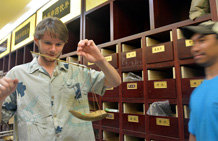
China pushes integrated medical and nursing care for elderly
Source:english.gov.cn
Updated: 2015-11-20
China seeks to establish an initial system of policies, standards and regulations for the integration of health care and nursing services for the elderly by 2017, as well as a series of related qualified institutions, according to a guideline issued by the State Council on Nov 20.
In particular, the government urged that more than 80 percent of medical institutions should provide convenience to elderly patients by setting up “green passages” for registration and consultation by 2017. Over 50 percent of nursing homes should offer medical services. Grassroots medical centers are encouraged to serve the elderly in local communities.
By 2020, the practice of “green passage” will be spread to all medical institutions nationwide, as well as medical services at nursing homes.
The State Council also encouraged nursing homes to cooperate in various forms with surrounding medical institutions to offer services such as consultation and health management to their residents.
Meanwhile, nursing homes can apply for establishing hospitals of geriatrics, recovery and palliative care, or set up internal medical departments, to help improve their fundamental capability in health care.
The government also welcomes social capital, according to market principles, to invest in institutions that offer medical and other services for the elderly. No qualified party should be barred or limited from this area as long as requirements are met.
In addition, the State Council vowed to boost policy support and further expand funding channels like public-private partnerships (PPP) for such institutions.

World Family Summit
The World Family Organization was founded in Europe in 1947 and headquartered in Paris.
Link: China's Central Government / World Health Organization / United Nations Population Fund / UNICEF in China
Copyright 2014 National Health and Family Planning Commission of the PRC All rights reserved






